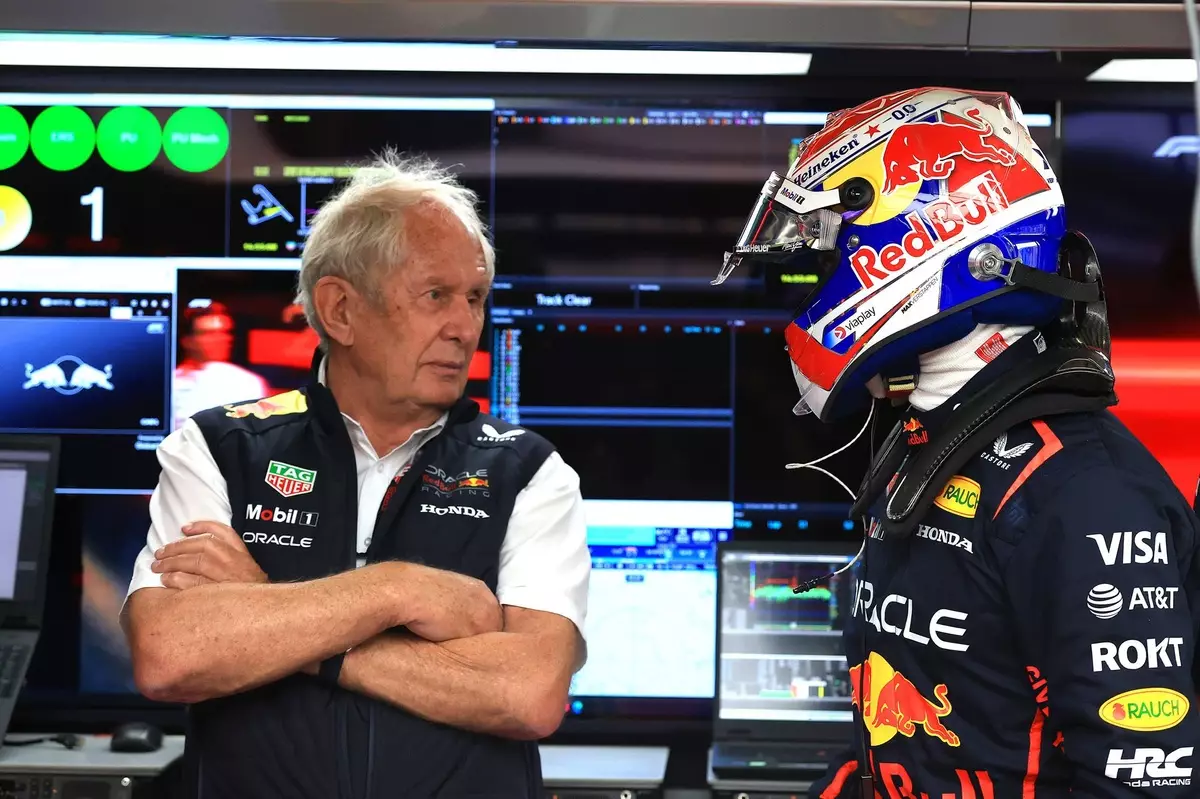The Pivotal Moments of Pressure Analyzing Verstappen’s Turbulent Spanish Grand Prix
Formula 1 racing is a spectacle of speed, strategy, and sometimes sheer chaos. This was especially true during the Spanish Grand Prix, where Max Verstappen, a champion known for his cool demeanor and incisive driving, faced unforeseen challenges that left fans and analysts abuzz. Watching from the sidelines, Helmut Marko, Red Bull’s seasoned advisor, couldn’t help but scrutinize the decisions Verstappen made in those final crucial laps. These moments of high tension highlighted the immense pressure drivers face and raised questions about decision-making under such intense scrutiny.
As the race approached its climax, the atmosphere was electric, and Verstappen found himself in a whirlwind of rapid-fire decisions. The situation became particularly tense when he yielded third place to Charles Leclerc after a safety car restart—a move that caught many by surprise. In Formula 1, every second counts, and such pivotal moments can make or break a race. Marko noted that this surrender of position might have spurred a series of misjudgments, culminating in an unfortunate clash with George Russell. It’s fascinating how quickly the tide can turn in this sport.
Key Takeaways
- Every decision in Formula 1 carries significant weight due to the high-speed nature of the sport.
- Emotional control is as crucial as technical skill for drivers in high-pressure situations.
- Team dynamics and leadership play vital roles in managing race-day stress and post-race reflections.
Understanding the Chain Reaction
The Spanish Grand Prix was a vivid display of how intertwined driver actions can lead to cascading effects on the track. Verstappen’s initial interaction with Leclerc was not just a matter of losing a position; it potentially set off a chain reaction that altered his mental state. This led to a more aggressive stance towards Russell later on. In racing, one misstep can unravel even the most strategic plans. As Marko pointed out, these exchanges are fraught with implications that can extend beyond individual races to affect team morale and strategy.

A deeper dive into Verstappen’s response during his encounter with Russell reveals the psychological pressures athletes endure. Marko observed an uncharacteristic hesitation followed by sudden aggression—actions that puzzled both spectators and officials. It was a stark reminder of how thin the line between calculated risk and impulsive action is in such high-stakes settings. The dynamics between strategy and instinct play out like an intricate dance where one wrong step can lead to unexpected consequences.
Consequences of Emotion
The aftermath of this tumultuous race was evident not only on the leaderboard but also in Verstappen’s demeanor. His interactions with Russell, alongside the mounting pressures throughout the race, seemed to amplify his frustration. It underscores an essential aspect of sports: emotional resilience is just as critical as physical prowess. Through this lens, we see Verstappen balancing on an emotional tightrope where his judgment was momentarily clouded by frustration—a testament to the intense mental demands placed on drivers.
This “moment of madness,” as some called it, wasn’t merely an isolated event but rather a culmination of several stressors converging at once. In his social media apology, Verstappen acknowledged a lapse in judgment—a rare admission from someone at the pinnacle of their sport. Such candidness offers insight into the human side of racing where even champions have their off days. While apologies are important, they also remind us that athletes are humans who navigate exceedingly demanding environments.
Marko’s Candid Reflections
Helmut Marko’s forthright analysis provided fans and insiders alike with valuable perspectives on Verstappen’s missteps. He highlighted the delicate balance between instinctual reactions and adherence to operational protocols within F1 racing. The 10-second penalty imposed on Verstappen served as a stark reminder that errors carry significant consequences—both immediately and in terms of broader reputation impacts within the sport. Additionally, Marko’s comments touched upon ongoing tensions with Russell, adding another layer to future track encounters.

Reflecting on team dynamics post-race offers a window into how Red Bull manages these high-pressure scenarios. The choice to skip an immediate debrief after such an emotionally charged event highlights complexities in leadership strategies when tempers are flaring. Sometimes giving space is necessary for cooler heads to prevail before constructive discussions can occur. This incident thus provides insights into how teams navigate internal challenges while maintaining focus on long-term goals.
Final Thoughts
Max Verstappen’s Spanish Grand Prix experience is more than just a recounting of individual errors; it serves as a broader commentary on human fallibility amidst fierce competition within Formula 1 racing’s high-octane environment. It reminds us that even seasoned champions can falter under pressure but also learn valuable lessons from these experiences. For enthusiasts watching closely, these events offer profound insights into both personal growth and team dynamics at play behind every race curtain.
Formula 1
Max Verstappen
Spanish Grand Prix
Red Bull Racing


Leave a Reply